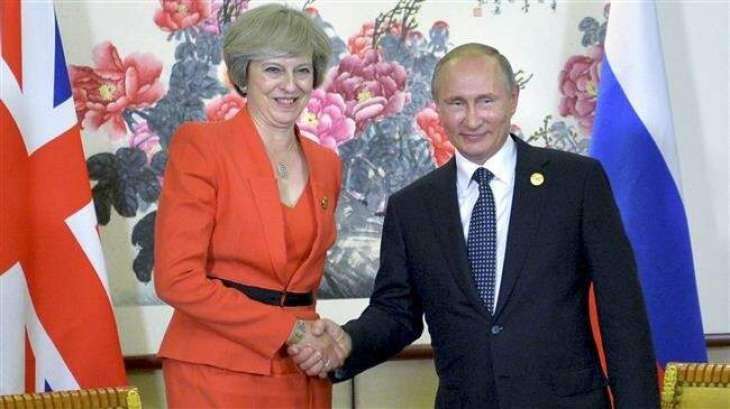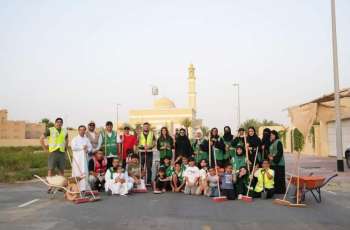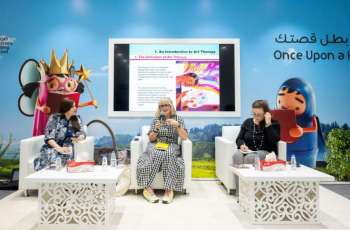Russian President Vladimir Putin met earlier on Friday with UK Prime Minister Theresa May on the sidelines of the G20 summit in Japan's Osaka
MOSCOW (Pakistan Point News / Sputnik - 28th June, 2019) Russian President Vladimir Putin met earlier on Friday with UK Prime Minister Theresa May on the sidelines of the G20 summit in Japan's Osaka.Diplomatic relations between the Soviet Union and the United Kingdom were established on February 2, 1924. The ties were then suspended on May 26, 1927, and resumed again on October 3, 1929.
On December 24, 1991, the United Kingdom officially recognized Russia as the successor to the Soviet Union.
Historically speaking, relations between Russia and the United Kingdom have never been simple, with the political dimension of these relations having been contradictory and ambiguous in recent years.
Until 2014, the bilateral dialogue between Russia and the United Kingdom had steadily.
From September 11-12, 2011, then-UK Prime Minister David Cameron paid an official visit to Moscow, during which the two countries signed a declaration on a knowledge-based modernization partnership, a memorandum of cooperation to create an international financial center in Moscow and other documents related to business cooperation.
On June 19, 2012, Putin and Cameron held a meeting on the sidelines of the G20 summit in Los Cabos, Mexico.
On August 2, 2012, Putin came to the United Kingdom for a short working visit. The Russian president and the UK prime minister discussed the prospects of trade, economic and energy cooperation between the two countries, as well as issues on the international agenda, and, in particular, the situation in Syria. The two leaders also attended the London Olympics.
On May 10, 2013, Cameron paid a working visit to the Russian resort city of Sochi.
Putin and Cameron met again on June 16, 2013. They held talks on the eve of the G8 summit in Lough Erne, Northern Ireland, at the residence of the UK prime minister.
The next meeting between Putin and Cameron took place on the sidelines of the G20 summit in St. Petersburg on September 6, 2013.
The leaders of Russia and the United Kingdom also held a bilateral meeting on June 5, 2014, in Paris.
On November 15, 2014, Putin met with Cameron on the sidelines of the G20 summit in Australia's Brisbane.
The leaders met again on November 16, 2015, in Antalya, Turkey, on the sidelines of the G20 summit and discussed the possibilities of a joint fight against terrorism and prospects for revitalizing bilateral cooperation.
On July 13, 2016, Putin sent a congratulatory message to Theresa May on the occasion of her appointment as the UK prime minister.
On September 4, 2016, Putin and May held a meeting on the margins of the G20 summit in the Chinese city of Hangzhou, during which they discussed matters of mutual concern.
On December 22, 2017, then-UK Foreign Secretary Boris Johnson paid the first in a couple of years visit to Moscow. The foreign ministers of the two countries discussed key issues in Russian-UK bilateral relations, focusing on the development of cooperation in trade, economic, cultural and humanitarian spheres, as well as on counterterrorism.
The positive evolution of the relations between Russia and the United Kingdom has been largely undermined by London's position regarding the situation in Ukraine and Crimea, as well as in Syria.
Before the current Putin-May meeting, Russian-UK political dialogue had been almost completely frozen. London unilaterally suspended all bilateral formats of intergovernmental cooperation which have proven to be effective the strategic dialogue in the so-called 2+2 format, at the level of foreign and defense ministers; the high level energy dialogue; the work of the Intergovernmental Steering Committee on Trade and Investment; and the work of the Ministerial Joint Committee on Science and Technology.
In fact, regular consultations between the foreign ministers were suspended, as was the entire range of questions related to bilateral military cooperation. High-level military visits were canceled; military and technical cooperation was frozen.
London has also announced that EU decisions regarding sanctions against Russian officials and companies were of direct significance to the UK authorities.
The UK officials are consistently increasing anti-Russian rhetoric in the context of the situation in Ukraine, "Russian propaganda" and "spreading fake news," "Russian interference in elections" and other internal processes in Western countries, "regular violations" of NATO airspace by Russian military aircraft and so on.
A sharp increase in tensions occurred in March 2018, after a former Russian intelligence agent Sergei Skripal and his daughter Yulia were poisoned in Salisbury.
The UK government, without waiting for the results of its own investigation and ignoring the possibility of using legal mechanisms and formats, including the Organisation for the Prohibition of Chemical Weapons and the European Convention on Mutual Assistance in Criminal Matters, took an unprecedented step declaring a number of unfriendly measures toward Russia.
On March 14, May announced that London was expelling 23 Russian diplomats, cutting off all high-level contacts, and also withdrawing an invitation to Russian Foreign Minister Sergey Lavrov to visit London.
On March 17, Moscow, in response, declared 23 UK diplomats persona non grata. In addition, Russia withdrew its permission for the United Kingdom to open a consulate in St. Petersburg and announced that the British Council activities in Russia were terminated.
About a year later, the UK authorities have not yet presented the results of the investigation on the Skripal case, and Russia has no consular access to Sergei and Yulia.
Despite the controversial political relations, there has been an increase in bilateral trade.
In 2018, bilateral trade amounted to $13.7 billion, compared to $12.7 billion in 2017. Russian exports totaled $9.7 billion, while imports reached $4 billion.
Trade between Russia and the United Kingdom in the first quarter of this year already reached nearly $4 billion, including $2.7 billion in Russian exports and $1.2 billion in Russian imports.
About 80 percent of Russia's exports are mineral products, while other exported goods include precious metals and stones, metals and products made of these metals, chemical industry products, and others.
In turn, the United Kingdom provides Russia with machinery, equipment and transport vehicles, chemical industry products, food and agricultural products, metals and products made of these metals.
Accumulated UK investments in the Russian economy currently amount to $23.8 billion, while Russian investments in the UK economy exceed $11 billion.
More than 600 enterprises with UK participation operate in Russia in mechanical engineering, pharmacy, and other innovative industries. Russian and UK energy corporations participate in the extraction and processing of oil and gas resources, raw materials, and the production and transportation of electricity. The UK oil and gas giant BP is the largest shareholder of the Russian oil and gas company Rosneft.
Contacts in the field of education, science, and culture are developing. In 2014, the cross year of culture was held at Russia's initiative. Its program included about 300 events. The UK-Russia Year of Languages and Literature in 2016 continued the large-scale cooperation in the field of culture.
The exhibition Russia and the Arts: The Age of Tolstoy and Tchaikovsky has been held with great success in the National Portrait Gallery in London. There have been also a number of events throughout Russia dedicated to the 400th anniversary of William Shakespeare's death.
The UK-Russia Year of Science and Education, which boosted scientific cooperation between the two countries, was held in 2017.
In 2019, Russia and the United Kingdom are holding a cross Year of Music.




